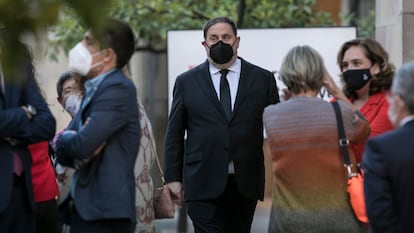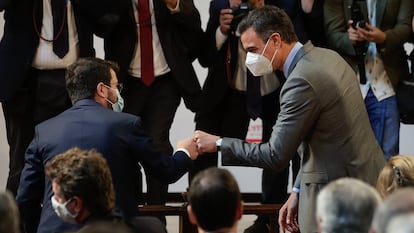Jailed Catalan separatist leader backs pardons and questions unilateral independence
Former deputy premier Oriol Junqueras says government clemency would be a welcome gesture to ‘relieve the pain’ and shows support for a negotiated referendum

A jailed leader of the 2017 breakaway bid in Catalonia has publicly backed proposed government pardons for himself and eight other independence leaders who were convicted of sedition. The pardons were described as “gestures that could relieve the conflict, ease the pain of repression and the suffering” of Catalan society.
Oriol Junqueras, president of the Catalan Republican Left (ERC) – a party that is currently in power in the northeastern Spanish region – also defended a “negotiated” referendum on the future of Catalonia as opposed to new unilateral approaches that he described as “not viable.”
Junqueras, who was the deputy premier of Catalonia at the time of the secession attempt, also admitted that the unilateral move did not have the full backing of Catalan society, and that any future initiatives toward independence should seek “an indisputable, plural majority.”
Junqueras’s statements represent the independence movement’s first clear show of support for the proposed government pardons
Left-leaning Catalan intellectuals believe that citizen support of between 60% and 70% for separatist parties would represent a majority that the Spanish government could not ignore. The regional election of February 14 was the first time that pro-independence parties secured more than 50% of the vote, although turnout was very low at just 54%.
“We need to be aware that our response was not understood as fully legitimate by an important part of society, also Catalan society,” said Junqueras on Monday, adding that the Spanish state’s own actions at the time of the secession attempt did not follow “democratic principles.”
His statements, made on Monday in the Catalan daily Ara and on the television station La Sexta, represent the independence movement’s first clear show of support for the proposed government pardons, which could be granted in the coming days according to Territorial Affairs Minister Miquel Iceta.

Spanish Prime Minister Pedro Sánchez, of the Socialist Party (PSOE), has come under considerable fire for proposing clemency for the nine separatist leaders, who are serving between nine and 13 years in prison and in some cases have now been behind bars for more than three years, including their time in pre-trial custody.
The opposition has warned that it will mount legal challenges against any attempt to grant what it sees as politically motivated pardons – Sánchez’s minority government has sought backing from Catalan separatist parties to pass relevant legislation, and conservative groups such as the Popular Party (PP) view the pardons as payment for this support. Even some leading members of Sánchez’s own party have called the pardons “sterile,” noting that none of the convicted individuals have shown any regrets, and even stated that they would do it all over again.
Meanwhile, legal bodies tasked with assessing the pardons have issued negative reports, leaving the executive alone in its defense of a tool that it feels could unblock stalled talks on Catalonia, where a new separatist government has just been sworn in following a regional election earlier this year.
Junqueras’s public remarks coincided with a visit by Sánchez to Barcelona, where the Spanish leader and the Catalan premier, Pere Aragonès of ERC, coincided at a business conference. At the event, Sánchez supported a return to the negotiating table, asking his audience to “bank on concord and get together to work.”
Is it a solution to the political conflict? Evidently, noElsa Artadi, spokesperson for Together for Catalonia
Until now, the independence movement had spurned the idea of government pardons, demanding a full amnesty instead. On October 22, 2019, one week after being sentenced to 13 years for sedition and misuse of public funds in his role as deputy premier of Catalonia during the secession attempt, Junqueras gave an interview on Nació Digital. In it, he said that “prison is also a way of planting a seed, a chance to explain this conflict to the world.” Then he added that “they can stick their pardons where the sun don’t shine.”
But on Monday, Junqueras described the proposed pardons as “gestures that could relieve the conflict, ease the pain of repression and the suffering” of Catalan society. “Any gesture to de-judicialize the conflict can help go down this road.”
Junqueras also admitted that the unilateral approach initiated by the regional parliament in 2017 was not viewed “as fully legitimate by part of the Catalan society.” He said that “we need an indisputable, plural majority that places the resolution of the conflict through democratic channels at the center of the agenda.”
In an apparent reversal of earlier statements – in January, he told the daily El Confidencial that he was not renouncing the option of a new unilateral secession attempt – Junqueras on Monday supported “the road of pacts and agreements, the road of a negotiated referendum.” He said that “this is the option that affords greater guarantees and immediate international recognition. Because we know that other avenues are not viable or desirable in that, in fact, they bring us further from the goal.”
Marta Vilalta, the spokesperson for ERC, denied that Junqueras is rejecting the option of a new unilateral independence attempt, but granted that “our priority approach is through dialogue and negotiation; let’s do it like Scotland.”
Elsa Artadi, the spokesperson for Together for Catalonia (Junts), the other party in power in Catalonia, described the pardons as “a personal solution” that is welcome in that it will release the prisoners. “Is it a solution to the political conflict? Evidently, no,” she said. “Is it a turning point by the government of Pedro Sánchez? Neither. It is a reaction to pressure from Europe, from international agencies and courts, which are telling Spain that this is not the way.”
Guilty of sedition
In October 2019, Spain’s Supreme Court court tried 12 leaders of the 2017 breakaway attempt and found nine guilty of sedition, while three more were barred from public office for disobedience.
The nine individuals found guilty of sedition were sentenced to between nine and 13 years in prison for organizing and holding an outlawed independence referendum on October 1, 2017. That was followed by an independence declaration passed by separatist parties inside the regional parliament. The Catalan premier at the time, Carles Puigdemont, fled Spain to avoid being tried for these events and has since been living in Belgium.
Catalans went to the polls on February 14 in a regional election that delivered a majority to pro-independence forces, although the non-separatist Catalan Socialist Party (PSC) won the most votes. After three months of stalled talks, ERC and Junts announced a deal to create a coalition government.
With reporting by Cristian Segura.
English version by Susana Urra.
Tu suscripción se está usando en otro dispositivo
¿Quieres añadir otro usuario a tu suscripción?
Si continúas leyendo en este dispositivo, no se podrá leer en el otro.
FlechaTu suscripción se está usando en otro dispositivo y solo puedes acceder a EL PAÍS desde un dispositivo a la vez.
Si quieres compartir tu cuenta, cambia tu suscripción a la modalidad Premium, así podrás añadir otro usuario. Cada uno accederá con su propia cuenta de email, lo que os permitirá personalizar vuestra experiencia en EL PAÍS.
¿Tienes una suscripción de empresa? Accede aquí para contratar más cuentas.
En el caso de no saber quién está usando tu cuenta, te recomendamos cambiar tu contraseña aquí.
Si decides continuar compartiendo tu cuenta, este mensaje se mostrará en tu dispositivo y en el de la otra persona que está usando tu cuenta de forma indefinida, afectando a tu experiencia de lectura. Puedes consultar aquí los términos y condiciones de la suscripción digital.








































